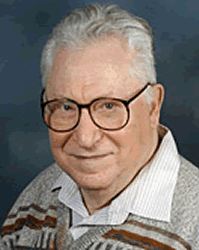Benjamin Harshav

Posted Tuesday, September 18, 2007 on IsraCast.com http://www.isracast.com/article.aspx?ID=812
Prof. Benjamin Harshav
The 2005 Emet Prize for the study of literature was awarded to Harshav (Hrushovski) for his unique position in shaping the study of literature in Israel in the past forty-five years, in dialogue with international scholarship; for founding a school of literary theory; for his important studies in the theory of the literary text, theory of prose, theory of poetry, and Jewish culture; and for his contribution to Hebrew literature itself, notably in poetry translations.
Professor Benjamin Harshav (Hrushovski) was born in Vilnius ( then Vilna) in 1928. During the Second World War his family fled to the Urals in the Soviet Union. In May 1946 he joined the Zionist-Socialist youth movement Dror-Hehaluts Ha-Tzayir in Poland and studied at its World Seminary in Germany. In Munich he was a co-editor of Lehavot, the Hebrew-Yiddish monthly of Dror. His first book of poetry was published at the age of 19. In May 1948 he arrived in Israel as an illegal immigrant and joined the Palmach.
After the War of Independence he studied at the Hebrew University in Jerusalem, where he obtained his B.A. and M.A. degrees in Hebrew Literature and Jewish History. As a student – with Nathan Zach, Arieh Sivan and Moshe Dor – he founded the journal Likrat, which launched a new direction in Hebrew poetry. In 1957-1960 he studied Comparative Literature with René Wellek at Yale University. In 1960-1966 he taught at the Hebrew University and created new courses. In 1966, with a group of former students, he founded the Department of Poetics and Comparative Literature at Tel Aviv University and chaired it until 1971. At the same time he founded the first Hebrew academic journal for the science of literature, HaSifrut, which he edited for many years. In 1975 he founded the Porter Institute for Poetics and Semiotics (for the Study of Literature and Communication). After retiring in 1987 he joined Yale University, and is now a fellow of the American Academy of Arts and Sciences.
He published over twenty books and dozens of articles and essays in Hebrew and English, some of them were translated into eleven languages. He was active in international academic organizations, served as a visiting professor at several universities and as a fellow in several Institutes for Advanced Studies. He was awarded the Uri-Zvi Grinberg Jerusalem Prize for poetry and the study of poetry and the Korot Prize for best Jewish book for his Marc Chagall and his Times. On his seventieth birthday, a two-volume Festschrift appeared in Hebrew (Aderet le-Binyamin) and a three-volume Harshav Festschrift in English.
Benjamin Harshav http://www.yivoinstitute.org/index.php?tid=158&aid=473
Benjamin Harshav (Hrushovski) is a member of the American Academy of Arts and Sciences and J.& H. Blaustein Professor of Hebrew and Comparative Literature, Yale University. For his lifetime's contribution to Israeli culture, he was awarded the EMET Prize (Art Science Culture) bestowed by the Prime MInister of Israel. Harshav was the founder of the Department of Literature and Director of the Porter Institute for Poetics and Semiotics at Tel Aviv University. In his academic journal HaSifrut he has published many studies of Yiddish literature.
Harshav was born in Vilna to Jewish teachers and worked at the YIVO Y.L. Peretz exhibition in Vilna at age 12. Among his many publications, Harshav has written several books on Yiddish, published two volumes of his own Yiddish poetry and translated a dozen books of Yiddish poetry into Hebrew. His first comprehensive study of Yiddish poetry was written in 1952.
His recent publications in this field include: The Other Culture: Yiddish and Jewish Discourse (Hebrew); A Gathering of Silences: The Poetry of A. Sutzkever (Hebrew); The Moscow Yiddish Theater: Art on Stage in the Time of Revolution (Yale University Press, 2007); Marc Chagall and the Lost Jewish World: The Nature of Chagall's Art and Iconography (Rizzoli, 2006); Marc Chagall and His Times: A Documentary Narrative (Stanford University Press, 2004) and The Meaning of Yiddish (Stanford University Press, 1999). Together with Barbara Harshav, he edited and translated into English several massive volumes: American Yiddish Poetry: A Bilingual Anthology (Stanford University Press, 2004): Sing Stranger: A Century of American Yiddish Poetry A Historical Anthology (Stanford University Press, 2006); The Complete Yiddish Poems of Menke Katz (Smith Publishers, 2005).